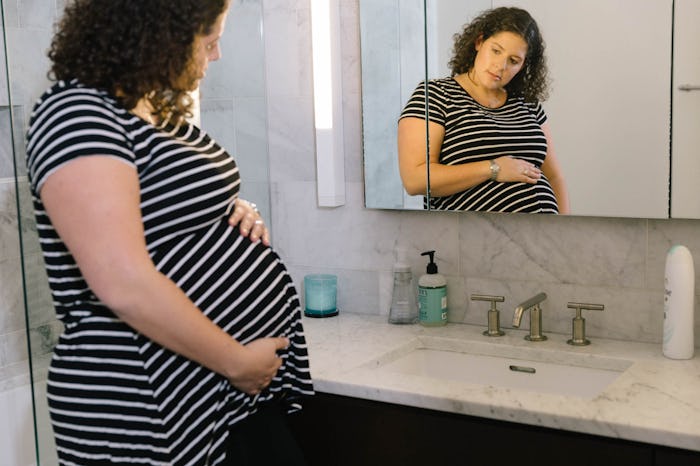Life
Here's How Often You Actually Should Pee When You're Pregnant
You know those giant pads for urinary incontinence? On television, they're advertised alongside cheerful seniors with tasteful salt-and-pepper haircuts. In reality, it's new moms I see purchasing those Depends. It's a sad truth that pregnancy and childbirth create health issues society doesn't talk much about, and urinary incontinence is just one. The secret to avoiding problems with peeing may begin in early pregnancy, with Kegel exercises and careful attention to your urological health. Don't be afraid to ask your doctor questions like, how often should you pee when you're pregnant? In the long run, staying on top of all aspects of pelvic health can only improve your quality of life.
Dr. Dana Rice, MD, of Fairfax, Virginia, is a urologist and creator of the UTI Tracker App. "Voiding dysfunction is a catch-all phrase for when things aren’t quite right," she tells Romper. "In women, it’s often frequency, urgency, or not being able to urinate." All pregnant people experience voiding dysfunction to some extent, Rice explains, and it starts in the first trimester, when pelvic blood vessels expand to increase blood flow to your uterus, hormones surge, and kidneys kick it up a notch. In fact, a study published in the International Urogynecology Journal found that pregnant women report needing to pee seven times more than they normally do during the day, and one or two times more than usual at night.
Urinary frequency is often an early sign of pregnancy, reported Parents, and many first trimesters are pocked with repeat bathroom breaks. In the second trimester, the pressure generally eases up, but don't worry: the constant need to go will be back in the final months, thanks to the baby trying to punt your bladder like a pro footballer. (Good news! Your partner has a legal responsibility to pause Games of Thrones while you go.)
While frequent urination is normal in pregnancy, it can also be the only symptom of a potentially dangerous infection. When your OB-GYN tests your urine at each prenatal visit, she's checking, among other things, for troublesome bacteria. "Up to 33 percent of women with urinary tract infections (UTIs) can have complications in their pregnancy, including preterm labor," explains Rice. UTIs are also associated with preeclampsia, anemia, and acute kidney injury, according to the Archives of Medical Science.
So exactly how often should you visit the loo when pregnant? As often as necessary, says Rice — and remember to stay hydrated to prime the pump. When you're dehydrated and thus, not going to the restroom enough, stagnant leftover urine can turn the bladder into a breeding ground for harmful bacteria.
"It's very important that we pee when the urge hits us," childbirth educator Jess Daggett, Mama Told Me, tells Romper. "It's OK to hold it a bit, but more than an hour of holding is painful for anyone, even without a baby practicing karate with our bladder." In terms of how often you should go, there's no magic number. However, if you're hanging out on the toilet all day, or not going despite drinking plenty of fluids, it's time to give your doctor a call, says Daggett.
It's common knowledge that pregnant people may have to dash off to the bathroom more often than they'd like, but many women are surprised to find themselves plagued by urinary incontinence, recurring UTIs, and the constant need to go in the weeks and months after the baby's born. To prevent incontinence after giving birth, Rice advises women to practice Kegels throughout the day — even every two-to-three hours — and to begin early in pregnancy. The UTI Tracker app can double as a Kegel alarm, Rice notes.
"Everyone thinks [Kegel exercises are] like your stomach," Rice observes. "You do three reps of 100 situps and you’re good to go. But Kegel exercises aren’t like that. The more you’re working these exercises into your routine, the more apt you are to have good control over your sphincters."
Luckily, women's health is slowly becoming more of a priority, in part because the number of female doctors continues to increase. "When people ask why I went into urology, I say, you know, there weren’t many women in urology for a long time," says Rice. "Do you think that if guys coughed, laughed, sneezed, and leaked that they would just be walking around accepting it? Or would the problem have been fixed 40 years ago?"
If you're pregnant, don't be embarrassed to talk to your doctor about your pelvic health, or to bring up issues like stress incontinence and frequency. Visit the ladies room whenever you've got to go, but if urinating ever becomes painful, you should call your doctor right away. Generally speaking, however, peeing 10 or 12 times a day is just the price of admission to the Pregnant Ladies Club. Talk to a mom: she'll understand.
Check out Romper's new video series, Romper's Doula Diaries:
Watch full episodes of Romper's Doula Diaries on Facebook Watch.
